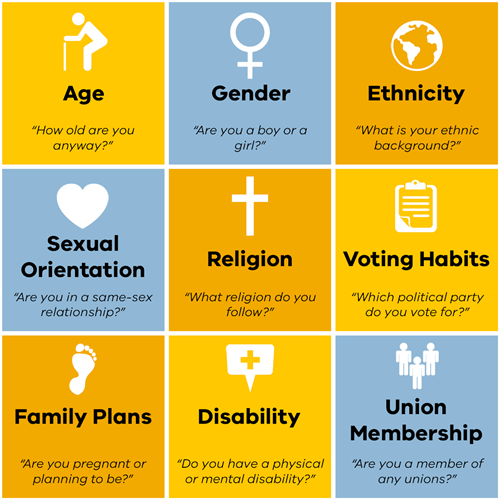Things you can’t ask when hiring
29 April 2022
Everyone wants to make sure they’re hiring the best possible candidates for the job, but did you know there are certain things employers cannot legally ask prospective employees?
Under the Equal Opportunity Act 2010, an employer cannot ask prospective employees for information that could be used to form the basis of discrimination. This is likely to include:

Age
Under the Age Discrimination Act 2004, employers may not use a prospective employee’s age (actual or presumed) to determine their suitability for a role.
Gender
Employers may not ask a prospective employee what gender they identify as, since it has no bearing on their ability to perform the duties of their role.
Ethnicity
Under the Racial Discrimination Act 1975, employers may not discriminate against a prospective employee because of their ethnic background. However, employers may inquire about related information only if it directly relates to the duties of the role. (See below.)
Sexual orientation
Employers may not inquire about a prospective employee’s sexual orientation, nor can they discriminate against them based on this information.
Religion
Employers may not discriminate against a prospective employee based on their religious beliefs or practice.
Voting habits
Employers may not use a prospective employee’s political opinion or party affiliation to determine their suitability for a role.
Family plans
Under the Sex Discrimination Act 1984, employers may not ask a prospective employee about their family plans. This includes their marital status or plans to have or adopt a child.
Disability
Under the Disability Discrimination Act 1992, employers may not discriminate against a prospective employee because of their physical or mental disability. However, an employer may require this information only if it directly impacts their ability to perform the role. (See below.)
Union membership
Employers may not discriminate against employees who are members of a union. They may also not require membership.
Are there exceptions?
Certain information that is reasonably required for non-discriminatory purposes may be asked depending on the circumstances (Fair Work Act 2009). For example, this may include information such as:
- the prospective employee’s citizenship or visa status in order to ascertain their right to work in Australia
- whether the prospective employer can speak a certain language where required in that role, or
- if the prospective employer has a physical disability that may impede their ability to perform a role where manual labour is required.
More information
You can find more information about workplace discrimination on the Fair Work Ombudsman website.
